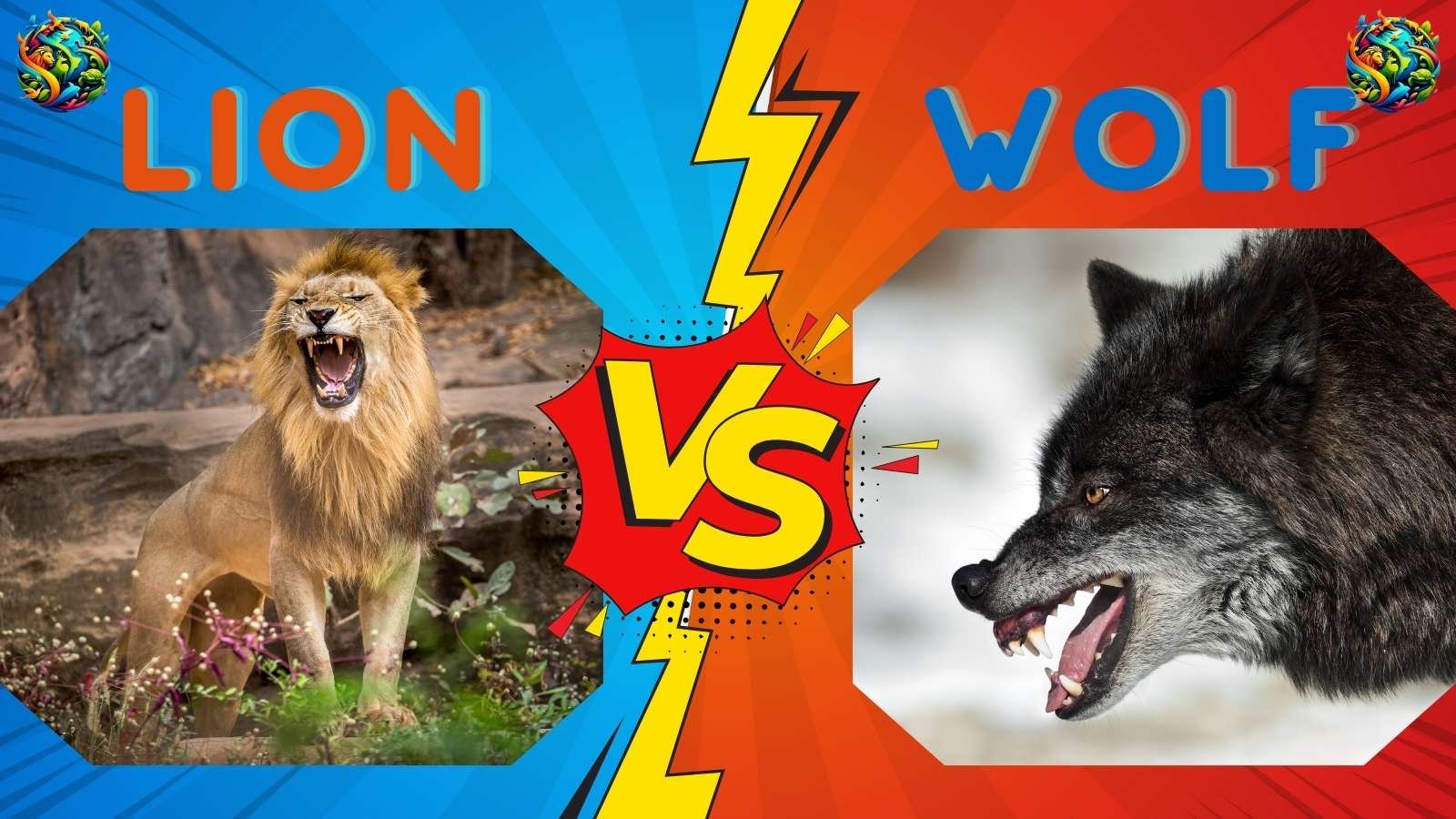Lion vs Wolf: The Ultimate Predator Showdown
Among the most fierce animals on Earth, few may rival the wolf or lion. Both of these animals are apex predators and have complex physicals, style of hunting, and even ways to survive. In this article, we compare the lion and wolf to decipher which of these two mighty hunters would win in a head-to-head confrontation.
Introduction: The King of the Jungle Vs The Master of The Hunt
There is a chance the first thing that comes to your mind when speaking of a fierce predator is a lion. Often referred to as the king of the jungle, the lion symbolizes power, domination, and pride. However, wolves are known for their intelligence, teamwork, and cunning nature. But what would happen if these two remarkably strong creatures came face to face? In this discussion, we shall try to clarify the ever existing debate of who would win between a lion and a wolf.
Basic Information on the Animals
The Lion
Scientific Name: Panthera leo

A lion is part and parcel of the family Felidae and is among the powerful locomotors of the major game animals. Adult male can be identified with an erect mane which makes them perhaps the most recognizable animals on earth. This also indicates strength. Once juvenile lions mature, they grow to weigh from 150kgs to over 250kgs for the males and 120 to 180kgs for females.
Lions can be found in open grasslands, savannas, and woodlands mainly located in Africa, apart from a small population that resides in India. They are social animals that are made up of a group called prides, which consists of related females, their offspring, and a few males. Their preferred diet mainly consists of large herbivories such as zebra, buffalo, and wildebeest.
Lions have a reputation for cooperating when it comes to hunting. Lionesses undertake most of the hunting while males aid in protecting the pride.
The Wolf
Scientific Name: Canis lupus

Canine predator, the wolf, is a pack animal that can be found in different environments including forests, tundra, grasslands, and deserts. One of the most famous species is the gray wolf, Canis lupus. Wolves weigh around 70 to 110 pounds and are a bit smaller than Lions. Their hunting is more robust due to their team oriented mentality, which increases their stamina.
Wolves as pack animals, have a sophisticated social structure and are endowed with great intelligence. To catch a large prey such as moose, elk, or deer, they cooperate and hunt in a group. Their exceptional communication skills where they use howls, barks, and even body language to signal attacks also set them apart.
Key Comparison Of Lion vs Wolf
Strength and power Of Lion vs Wolf
- Lion: The Lion is a true physical beast. With the lion being one of the brutes in the animal kingdom, having muscular body structure, sharp claws, and a dominant bite. With a bite that can reach up to 650 psi, this predator has the capacity to break bones.
- Wolf: Wolves are comparatively smaller than lions, so their strength is not even close to what the lion brings to the table. Worlf’s bites are monsters too though, with a powerful 400 psi force. Compared to lions, wolves don’t focus on brute strength, but rather endurance.
Winner: Lion. It is fair to say lions are powerful beasts. Being so gigantic gives them an upper hand in combat, against any living organism that comes head to head with them.
Speed Of Lion vs Wolf
- Lion: Lions are hunters too, and they can achieve an impressive 35 mph when trying to hunt something down, but the speed can only be maintained for a brief distance.
- Wolf: Wolves may not compare to cheetah’s ferocity but they are the next best thing, being able to hit suprising speeds of 40 mph. They are great at chasing prey down for long duration, making them extremely deadly at supplanting other animal’s food.
Winner: Wolf. Compared to lions wolves are miles ahead.
Endurance Of Lion vs Wolf
- Lion: Lions can only sprint for a brief period. In most cases, after a sprint they are bound to feel fatigue. Their hunting strategy depends on stealth and surprise which enables them to kill swiftly.
- Wolf: Wolves have tremendous stamina, and endurance which is remarkable. They have the ability to run at an average speed for numerous hours and follow their prey over large distances. This skill enables them to tire their prey which is beneficial in long hunts.
Winner: Wolf. Being the best at endurance, stamina, and long hunts make wolves the clear winner in this round.
Intelligence Of Lion vs Wolf
- Lion: Although lions show some degree of intelligence, their hunting plans are primarily reliant of their strength and ability to form small groups. They implement stealth and muscle instead of tactics and intelligence.
- Wolf: Wolves are very intelligent with compound social behaviors. They hunt in groups utilising well-orchestrated plans that require a good amount of tactic. Wolves are also able to learn and adjust to new surroundings.
Winner: Tie. Each animal demonstrates intelligence in their own fashion. For lions it is with brute strength while for wolves it is teamwork and strategy.
Who Would Win in a Fight Of Lion vs Wolf?
Let’s imagine a full-out tackle between a lion vs wolf. The lion, who is larger than life with a raw muscle-filled body, would most probably charge the wolf first. Lion’s take the first swing with its claws, lofty limbs and sharp teeth, while the mane encircles the head like a helmet, protecting the lion from being bitten.
The wolf, on the other hand, possesses more speed and agility. With a strategical plan set in place, the wolf could swiftly dodge any and all powerful strikes thrown by the lion whilst searching for a chance to take a bite. Wolves as we know are extremely strategic, and may even try to outpace the lion, and can use their endurance to wear out the lion.
In summary, the wolf might be agile, but the lion’s combat experience and size would overpower the wolf in a direct confrontation. The lion’s sharp claws paired with the powerful bite are enough to quell the wolf in a matter of seconds, leaving very little time for a counterattack.
Winner: Lion. Predominantly, the lion would win one-on-one battle because of its weight, muscles, age, and fighting experience.
Significance & Impact Of Lion vs Wolf
- Lion: Found at the top of the food chain as an apex predator, it is of no doubt that the lion has a crucial role in keeping the number of herbivores in check. Lions control the number of prey to avoid overgrazing causing chaos in the food chain. They are a keystone species in the African savanna.
- Wolves: Wolves also serve as apex predators, specifically in the forests and tundra regions. Their packs control the number of herbivores, including deer, and moose, while also ensuring that overpopulation of weak prey does not damage the ecosystem.
Winner: Lion and wolf are both types of apex predators and crucial to the ecosystems in which they are found. Consequentially, the winner is tied as wolves manage the balance in the forests and tundra while lions handle the herbivore population in Africa.
Final Verdict: Who Would Win Lion vs Wolf ?
Because combat proficiency, dimensions, strength, and various attributes such as speed and survival tactics are considered, the duel between the wolf and lion is inconclusive:
- Strength & Power → Lion
- Speed (Sprints) → Wolf
- Endurance → Wolf
- Intelligence → Tie (Lions = strategy & power, Wolves = teamwork)
- Survival & Adaptability → Wolf
Overall Winner: The Lion with Combat, The Wolf with Survival
If there were to be a hypothetical battle of lion vs wolf, the lion would completely dominate the fight because of its stature and stronger muscles. Nonetheless, the wolf can easily trick the lion with its sharp wits and can rely on the ability to easily maneuver around and outthink the lion while waiting until the right time for the indirect battle to commence or play the waiting game in a war of attrition.
Deciding victor will come down to the scenario, level of modification needed, and tactics each animal employs. It’s likely the lion will proceed to claim the combat victory, however, the wolf boasts superior modification capabilities and can outlast the lion, therefore proving more useful in the adaptability aspect.




